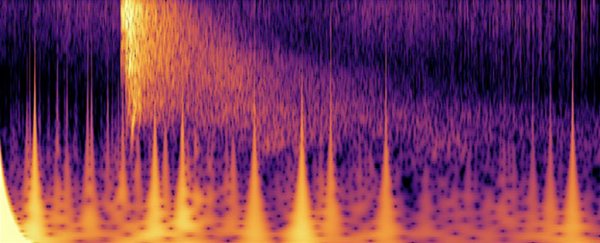In terms of seismic events on the red planet (or indeed any other planet besides Earth), this is the biggest one recorded so far: the NASA InSight lander has recorded a 'monster' of a marsquake, which is estimated to have hit magnitude 5 on the scale used on Earth.
That beats the previous record holder, a magnitude-4.2 marsquake that Insight recorded back on 25 August 2021. The new quake happened on Mars on May 4 of this year, the 1,222nd sol (or Martian day) of the lander's mission.
A magnitude-5 quake on Earth would be classed as moderate, only causing minor damage. However, it's right at the upper end of the size of quakes that scientists are discovering on Mars, due to less seismic activity.
 The full marsquake spectrogram. (NASA/JPL-Caltech/ETH Zurich)
The full marsquake spectrogram. (NASA/JPL-Caltech/ETH Zurich)
Right now we don't know what caused the marsquake or where exactly on the red planet it originated from, but it's already of intense interest for researchers. It adds to the more than 1,300 quakes that Insight has detected since landing in November 2018.
By studying the seismic waves traveling across Mars, scientists hope to learn more about the planet's crust, mantle, and core. That in turn should inform understanding about how Mars (and other similar planets, such as Earth) formed in the first place.
"Since we set our seismometer down in December 2018, we've been waiting for 'the big one'," says planetary geophysicist Bruce Banerdt from the Jet Propulsion Laboratory (JPL) in California, and the leader of the InSight mission.
"This quake is sure to provide a view into the planet like no other. Scientists will be analyzing this data to learn new things about Mars for years to come."
As marsquakes aren't typically as violent as earthquakes, they're more difficult to detect, and other vibrations – from the wind, for example – can interfere with readings. With that in mind, InSight is fitted with a highly sensitive seismometer called the Seismic Experiment for Interior Structure.
Volcanic activity is also thought to be generating seismic waves on Mars, and experts continue to identify new patterns in the data that Insight and its seismometer have already logged and beamed back to Earth.
With that in mind, you can expect to hear plenty more about the data collected by Insight on 4 May 2022, in the future, but for now it's clear that the quake is a record-breaker – and way above average for what would normally be expected on Mars.
Unfortunately, Insight has now run into some technical difficulties: With the onset of the Martian winter and increased levels of dust in the air, the lander is struggling to get enough sunlight on the solar panels that power it up.
As a result, the machine has put itself into safe mode for the time being. This hibernation shuts down all but the most essential functions, and it may be some time before we hear anything from Insight again.
